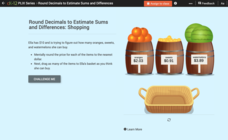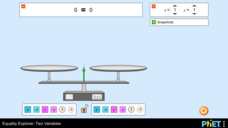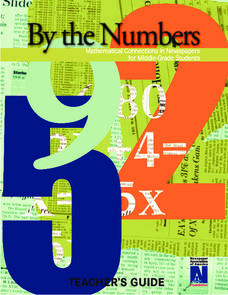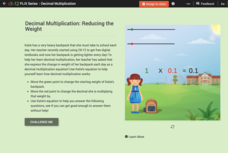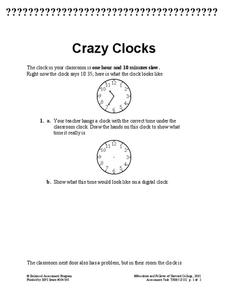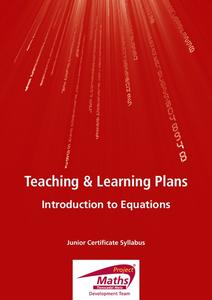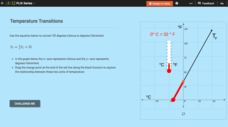CK-12 Foundation
Conversion of Decimals, Fractions, and Percents
Five questions—true or false and multiple-choice—challenge mathematicians to convert decimals, fractions, and percents. An interactive table displays how to write a portion of shapes in a variety of ways. A discussion question concludes...
CK-12 Foundation
Problem Solving Plan, Estimation with Decimals: Shopping
Mathematicians go on a virtual shopping trip in an interactive designed to boost the concept of estimation. Scholars read and answer five questions—multiple-choice, true or false, and a discussion—with help from a drag-and-drop shopping...
CK-12 Foundation
Comparison of Fractions, Decimals, and Percents: Filling in the Squares
An interactive equipped with five questions challenges mathematicians to convert between fractions, decimals, and percents. A diagram changes its size to visually depict conversions alongside symbols to compare them. Question types...
CK-12 Foundation
Fractions as Percents: Baking Cookies
A five-question interactive challenges mathematicians to solve word problems involving fractions as percents. Baking two different types of cookies and needing the exact amount requires scholars to make fractions, turn them into...
PHET
Equality Explorer: Two Variables
Solving equations in two variables can't be that much harder than solving equations in one variable. Using a balance interactive, scholars solve equations in two variables. They apply inverse operations by adding -x, -y, or -1 as...
PHET
Equality Explorer
Find the right balance between concrete and abstract thinking. After using interactive balances to explore inverse operations, learners solve multi-step equations with variables on both sides. Of course, they can still use the...
PHET
Equality Explorer: Basics
Not all interactives are made equal. Scholars use an interactive balance to explore the concept of equality. They place different objects on balances to determine the number of each object needed to balance the scale.
Newspaper Association of America
By the Numbers: Mathematical Connections in Newspapers for Middle-Grade Students
A cross-curricular resource teaches and reinforces mathematical concepts with several activities that use parts of a newspaper. Scholars use scavenger hunts to find the different ways math is used in the paper along with using data...
CK-12 Foundation
Decimal Multiplication: Reducing the Weight
Eight questions challenge mathematicians to multiply decimals. A color-coded tool with movable parts assist participants in answering word problems. Item response types include fill in the blank, multiple-choice, and a discussion.
CK-12 Foundation
Estimation of Whole Number Multiplication and Division: Lettuce Garden
Estimating whole number multiplication and division is the focus of an interactive that uses a garden plot with moveable points to answer six questions.
CCSS Math Activities
Smarter Balanced Sample Items: 7th Grade Math – Target D
Put expressions, equations, and inequalities to work! Young scholars solve problems using various strategies. Meant as a snapshot of the Smarter Balanced Assessment, a set of seven questions includes topics from writing expressions to...
Concord Consortium
Crazy Clocks
While a stopped clock is right twice a day, a fast or slow clock confuses people for weeks. Scholars observe a clock running slow and must correct it before observing a clock running fast and working it backward. Finally, a multi-step...
Mascil Project
Building a Safe Staircase
Climb up the staircase of engineering knowledge. After watching a video of a carpenter measuring out steps for a set of stairs, pupils learn about the terminology and regulations involving stairs. They see how to use a rule of thumb when...
CCSS Math Activities
Picking Apples
Pick the resource while it's ripe. A performance task challenges young mathematicians to consider the costs of apple picking. They compare the costs for two different orchards for different situations.
Project Maths
Introduction to Equations
Do your pupils truly understand inverse operations, or is their understanding a little backward? Scholars learn the meaning of an equation in the second lesson of a four-part Algebra series. A series of activities begins with an analysis...
101 Questions
Blocks
Block play can teach children about gravity, physics, and spatial relationships. A hands-on lesson incorporates these concepts with an activity in which learners examine the relationship between levels in a pile. Scholars begin to...
Teach Engineering
Determining Densities
Don't be dense—use a robust resource. The second installment of a five-part Floaters and Sinkers unit has learners determine the densities of several objects. As part of the activity, they learn the displacement method for finding...
Teach Engineering
Floaters and Sinkers
Whatever floats your boat. Young engineers learn about density by measuring the masses and volumes of boxes filled with different materials. Using their knowledge of densities, they hypothesize whether objects with given densities will...
Shodor Education Foundation
Incline
Study velocity while examining graphical representations. As scholars work with the animation, they discover the effect the height of an incline has on the velocity of the biker. They make conclusions about the slope of the line in terms...
CK-12 Foundation
Solving Real-World Problems Using Multi-Step Equations: Bowling Ball Delivery
How many bowling balls can a truck carry? A slider interactive changes the weight of boxes and the number of bowling balls per box. Investigating with this slider lets users find the maximum number of bowling balls.
CK-12 Foundation
Linear Equations: Temperature Transitions
Explore linear conversions using an engaging interactive lesson. Learners drag a point on a graph to discover the equivalent degrees in Fahrenheit and Celsius. Embedded questions highlight key features such as slope and the y-intercept.
California Education Partners
T Shirts
Which deal is best? Learners determine which of two companies has the best deal for a particular number of shirts. They begin by creating a table and equations containing each company's pricing structure. Individuals finish the seventh...
California Education Partners
Speedy Texting
Model the effects of practice on texting speed. Pupils develop a linear equation that models the change in texting speed based on the amount of practice. The sixth performance task in an eight-part series requires learners to solve and...
Noyce Foundation
Diminishing Return
Challenge individuals to compete as many tasks as possible. Lower-level tasks have pupils apply costs and rates to solve problems. Upper-level tasks add algebraic reasoning and conditional probability to the tasks.



